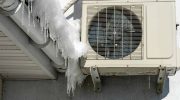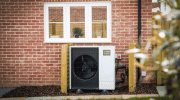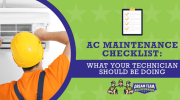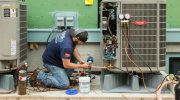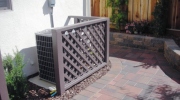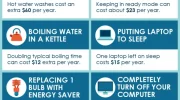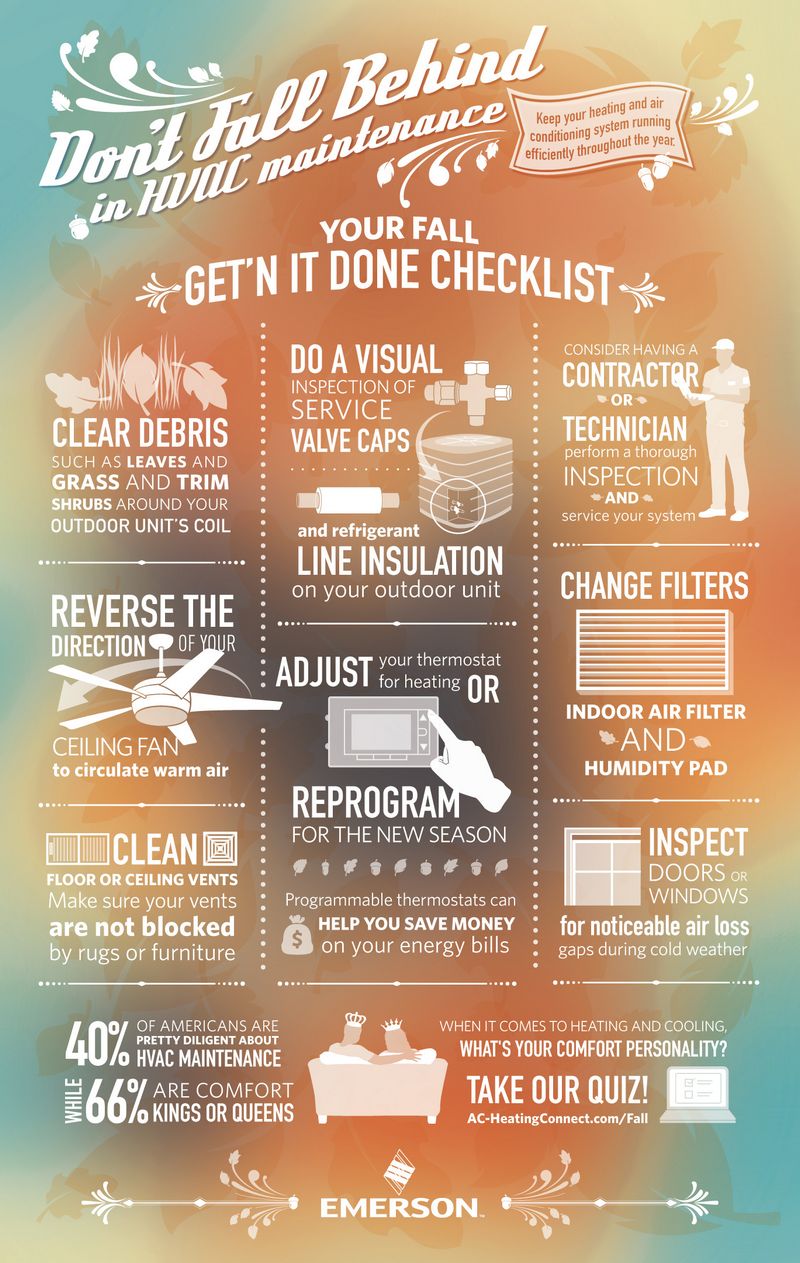
HVAC Tips & Tricks
When it comes to maintaining a comfortable temperature in your home or office, the HVAC system plays a crucial role. HVAC, which stands for Heating, Ventilation, and Air Conditioning, is responsible for cooling and heating your space, ensuring optimal comfort and air quality. However, achieving efficient cooling and heating can sometimes be a challenge.
Fortunately, there are a few tricks and tips that can help you make the most out of your HVAC system. One of the first things to consider is adjusting your thermostat settings. Thermostats that are set too low during summer or too high during winter can lead to excessive energy consumption. By finding the ideal temperature for each season, you can strike a perfect balance between comfort and efficiency.
In addition to adjusting the thermostat, regular maintenance is key to maximizing the efficiency of your HVAC system. Dust and debris can accumulate in the system’s filters and ducts, obstructing airflow and reducing its cooling or heating capacity. By scheduling regular maintenance, you can ensure that your HVAC system is running smoothly and efficiently.
Another tip for efficient cooling and heating is to keep your home well-insulated. Poor insulation can result in heat transfer between the indoors and outdoors, making it harder for your HVAC system to maintain the desired temperature. Sealing air leaks, adding insulation to walls and attics, and using weatherstripping around doors and windows are effective ways to improve insulation and enhance energy efficiency.
Lastly, investing in energy-efficient appliances and making use of programmable thermostats can significantly contribute to a more efficient HVAC system. Energy-efficient appliances are designed to consume less power while delivering the same cooling or heating performance, reducing your energy costs. Programmable thermostats, on the other hand, allow you to set different temperature settings for different times of the day, ensuring that your HVAC system is only running when it’s needed.
By implementing these tips and tricks, you can make your HVAC system more efficient, saving both energy and money without compromising on comfort. Whether it’s adjusting your thermostat, scheduling regular maintenance, improving insulation, or upgrading to energy-efficient appliances, these simple steps can go a long way in achieving optimum cooling and heating in your space.
Importance of Regular Maintenance
Maintenance is essential for the optimal functioning of any HVAC system, whether it’s for cooling or heating. Regular maintenance ensures the system operates efficiently, extends its lifespan, and helps avoid costly repairs. Below are some tips to highlight the importance of regular maintenance for your HVAC system:
- Improved Efficiency: Regular maintenance helps improve the efficiency of your HVAC system. Cleaning or replacing air filters, checking thermostat settings, and ensuring proper airflow can all contribute to better energy efficiency. This, in turn, helps reduce energy consumption and lowers utility bills.
- Extended Lifespan: Consistent maintenance can prolong the lifespan of your HVAC system. Cleaning and lubricating moving parts, inspecting electrical connections, and checking refrigerant levels can prevent premature wear and tear, ensuring that your system functions optimally for a longer period of time.
- Enhanced Comfort: Regular maintenance helps maintain a comfortable indoor environment. By cleaning air ducts, inspecting and cleaning coils, and optimizing airflow, you can ensure that your HVAC system is providing the desired level of heating or cooling throughout your home or office.
- Healthier Air Quality: A well-maintained HVAC system improves indoor air quality by reducing dust, allergens, and contaminants. Cleaning air filters, removing debris from outdoor units, and scheduling professional duct cleaning can all contribute to a healthier living or working environment.
- Prevent Future Issues: Regular maintenance allows HVAC technicians to identify potential issues before they become major problems. Timely detection of worn-out parts, leaks, or faulty electrical connections can save you from expensive repairs or system breakdowns.
In conclusion, regular maintenance should not be overlooked when it comes to your HVAC system. By prioritizing maintenance tasks, you can ensure that your cooling or heating equipment operates at its best, saving energy, money, and headaches in the long run.
Energy Saving Techniques
When it comes to saving energy and reducing utility bills, there are various techniques you can implement in your HVAC system. These techniques can help you to optimize the performance of your system while keeping your cooling and heating costs under control.
- Programmable Thermostat: Installing a programmable thermostat allows you to set different temperature levels for different times of the day. By programming the thermostat to lower the temperature when you’re away or sleeping and increase it when you’re home, you can save on energy consumption.
- Cooling and Heating Tips: Simple tips like closing doors and windows when running your HVAC system and sealing any air leaks can help maintain optimal cooling and heating levels, reducing the workload on your HVAC system and enhancing overall efficiency.
- Maintain HVAC system: Proper maintenance of your HVAC system is crucial for efficient operation. Regularly cleaning or replacing air filters, ensuring proper airflow, and scheduling professional maintenance checks can improve the efficiency and longevity of your system.
- Maximize Airflow: Keep airflow in mind by avoiding furniture or objects blocking vents and registers. Proper airflow ensures that your HVAC system can distribute cooled or heated air efficiently throughout your home.
- Consider Energy-Efficient Upgrades: Upgrading your HVAC system to a more energy-efficient model can provide long-term savings. Look for systems with high SEER (Seasonal Energy Efficiency Ratio) ratings for cooling and AFUE (Annual Fuel Utilization Efficiency) ratings for heating.
By following these energy-saving techniques, you can not only lower your energy bills but also contribute to a greener and more sustainable environment.
Proper Temperature Settings
When it comes to heating and cooling your home, setting the right temperature can make a big difference in both comfort and efficiency. Here are some tricks to help you find the perfect temperature settings for your HVAC system:
- Understand the ideal heating and cooling temperatures: The ideal temperature for heating typically ranges between 68 and 72 degrees Fahrenheit (20 and 22 degrees Celsius), while the ideal temperature for cooling is around 78 degrees Fahrenheit (25 degrees Celsius).
- Take advantage of natural heating and cooling: Use sunlight to your advantage during colder months by keeping curtains open to let in natural warmth. Similarly, close curtains and blinds during hot periods to block out the heat.
- Use programmable thermostats: Investing in a programmable thermostat allows you to set different temperatures for different times of the day. This way, you can reduce heating or cooling when you’re not at home, saving energy and money.
- Consider airflow and ventilation: Poor airflow can make a room feel warmer or colder than it actually is. Keep vents clean and unobstructed, and consider using fans or opening windows to improve air circulation.
- Regular HVAC maintenance: Proper maintenance of your HVAC system ensures it operates efficiently. This includes changing air filters regularly, scheduling professional maintenance checks, and cleaning vents and ducts.
Finding the right temperature settings for your HVAC system requires some experimentation. Start with the recommended temperature ranges and adjust based on your comfort preferences and energy efficiency goals. By following these tips, you can optimize your heating and cooling settings for maximum comfort and efficiency.
Choosing the Right HVAC System
When it comes to selecting the right HVAC system for your home or office, there are a few tricks and tips that can help you make the best decision. In addition to considering factors like size, capacity, and brand, it’s important to think about maintenance and efficiency. Here are some key points to keep in mind:
- Consider your cooling and heating needs: Before purchasing an HVAC system, assess your cooling and heating needs. Take into account the size of the space, the number of rooms, and the climate in which you live. This will help you determine the appropriate capacity and type of system to choose.
- Look for energy efficiency: HVAC systems can have a significant impact on your energy bills. Look for models that have high energy efficiency ratings. The higher the rating, the more efficient the system is and the more money you can save in the long run.
- Pay attention to airflow: Good airflow is crucial for optimal cooling and heating. Make sure the system you choose has proper airflow capabilities. This can help maintain a comfortable temperature throughout your space and prevent issues like hot or cold spots.
- Consider maintenance requirements: HVAC systems require regular maintenance to ensure they continue to operate efficiently. Before making a purchase, consider the maintenance requirements of different models. Look for systems that have easily accessible filters and offer features like self-cleaning to make maintenance easier.
- Research reputable brands: When choosing an HVAC system, it’s important to research and choose reputable brands. Look for brands that have a proven track record for quality and reliability. Reading customer reviews and consulting with HVAC professionals can also help you make an informed decision.
By considering these tips and tricks, you can choose the right HVAC system for your cooling and heating needs while maximizing efficiency and minimizing maintenance requirements.
Benefits of Programmable Thermostats
Programmable thermostats are a great tool to improve the efficiency of your HVAC system and save on energy costs. Here are some benefits of using programmable thermostats:
- Energy Savings: One of the main benefits of programmable thermostats is the potential for energy savings. By programming your thermostat to automatically adjust the temperature settings based on your schedule, you can avoid unnecessary heating or cooling when you’re not in the house. This can result in significant energy savings over time.
- Comfort and Convenience: With a programmable thermostat, you can easily set different temperature settings for different times of the day. This means you can wake up to a warm house in the morning, have a comfortable temperature during the day, and save energy while you sleep. It provides a more comfortable living environment and eliminates the need to manually adjust the temperature multiple times a day.
- Optimized Cooling and Heating: Programmable thermostats allow you to customize temperature settings to match your cooling and heating preferences. You can set the temperature higher when you’re away or lower when you’re sleeping to maximize energy efficiency without sacrificing comfort.
- Improved Airflow Management: Some programmable thermostats also offer features to control and manage airflow. This can help ensure that your HVAC system is distributing heated or cooled air evenly throughout your home, improving comfort and reducing energy waste.
- Integration with Smart Home Systems: Many modern programmable thermostats can be integrated with smart home systems, allowing you to control your HVAC settings remotely or through voice commands. This adds an extra layer of convenience and control to your home.
In conclusion, programmable thermostats provide numerous benefits in terms of energy savings, comfort, convenience, optimized cooling and heating, improved airflow management, and integration with smart home systems. Considering these advantages, investing in a programmable thermostat can be a wise choice for homeowners.
Indoor Air Quality Improvement
When it comes to HVAC systems, ensuring good indoor air quality is crucial. Poor air quality can lead to health issues and discomfort for occupants. Here are some tips and tricks to improve indoor air quality:
1. Regular HVAC Maintenance:
- Regularly clean and replace air filters to remove dirt, dust, and other particles from the air.
- Inspect and clean air ducts to minimize the accumulation of debris and allergens.
- Schedule professional HVAC maintenance at least once a year to ensure optimal performance.
2. Control Moisture:
- Maintain appropriate humidity levels to prevent the growth of mold and mildew.
- Use dehumidifiers or air conditioners to reduce moisture in humid areas.
- Fix any leaks or water damage promptly to prevent the growth of mold.
3. Proper Ventilation:
- Ensure proper airflow by keeping vents and registers clean and unobstructed.
- Open windows when the weather permits to allow fresh air circulation.
- Install exhaust fans in kitchens and bathrooms to remove odors and moisture.
4. Avoid Harmful Substances:
- Avoid smoking indoors as it can significantly degrade indoor air quality.
- Use non-toxic cleaning products to minimize the release of harmful chemicals.
- Check for and address any sources of indoor air pollution, such as gas leaks or radon.
5. Monitor and Adjust Thermostat Settings:
- Set your thermostat to a comfortable temperature to prevent excessive humidity or dryness.
- Program your thermostat to adjust temperature settings for different times of the day.
- Consider using a smart thermostat that can optimize HVAC efficiency and indoor air quality.
6. Increase Natural Air Circulation:
- Use fans to improve air circulation and reduce stagnant air.
- Arrange furniture to allow for unrestricted airflow and circulation.
- Consider using air purifiers or filters to remove allergens and pollutants from the air.
By following these tips and tricks, you can significantly improve the indoor air quality in your home or office. Remember, a well-maintained HVAC system and good ventilation are key to ensuring clean and healthy air for all occupants.
Heat Pump vs. Furnace: Which is Better?
When it comes to HVAC systems, there are two main options for heating your home: a heat pump or a furnace. Both have their advantages and disadvantages, so it’s important to understand the differences before making a decision.
The Basics
A heat pump is a system that uses refrigerant to transfer heat from the outdoor air into your home during the winter months. It can also reverse the process and act as an air conditioner during the summer. On the other hand, a furnace uses fuel, such as natural gas or propane, to generate heat, which is then distributed throughout your home via ducts.
Efficiency
When it comes to efficiency, heat pumps are generally more energy-efficient than furnaces. This is because they don’t rely on burning fuel to produce heat. Instead, they transfer heat from one place to another, using electricity to power the process. In contrast, furnaces have varying levels of efficiency depending on the type and model. However, newer furnace models have higher efficiency ratings than older ones.
Heating Capability
In terms of heating capability, both heat pumps and furnaces can effectively provide warmth for your home. However, heat pumps may struggle to efficiently heat your home in very cold climates, as they rely on extracting heat from the outdoor air. In such cases, a furnace may be a better option, as it can provide consistent and reliable heat even in extremely cold temperatures.
Maintenance
Both heat pumps and furnaces require regular maintenance to ensure optimal performance. Heat pumps require periodic cleaning of outdoor coils and checking refrigerant levels, while furnaces need filter replacements and inspections to detect any potential issues. It’s recommended to schedule annual maintenance for both types of systems to keep them in good working condition.
Thermostat Compatibility
Heat pumps and furnaces can have different thermostat requirements. Heat pumps often require a special type of thermostat that can handle both heating and cooling functions since they can also be used for air conditioning. On the other hand, furnaces typically work with standard thermostats. It’s important to check the compatibility of your current thermostat or select a new one that is appropriate for your chosen heating system.

Conclusion
In conclusion, the decision of whether to choose a heat pump or a furnace depends on your specific needs and circumstances. A heat pump may be more energy-efficient and suitable for moderate climates, while a furnace can provide reliable and consistent heat in colder regions. It’s advisable to consult with an HVAC professional who can evaluate your home and help you make an informed decision.
Ductwork Efficiency Optimization
Efficiency is key when it comes to maintaining your HVAC system. One area that often goes overlooked is the ductwork. Optimizing the efficiency of your ductwork can help improve airflow, reduce energy consumption, and lower utility bills. Here are some tips and tricks to maximize the efficiency of your ductwork:
- Maintenance: Regularly inspect and clean your ductwork to remove any obstructions or blockages. Dirty or clogged ducts can restrict airflow, reducing the efficiency of your HVAC system.
- Sealing: Ensure that all joints and connections in your ductwork are properly sealed. Leaky ducts can lead to air leakage, causing your system to work harder and increasing energy consumption.
- Insulation: Properly insulating your ductwork can help prevent heat gain or loss. Insulated ducts can maintain a more consistent temperature, reducing the workload on your HVAC system.
- Thermostat Settings: Use programmable thermostats to optimize temperature settings. Adjusting the temperature when you’re away from home or sleeping can help save energy and improve overall efficiency.
- Airflow Restriction: Avoid blocking vents and registers with furniture or other obstructions. Proper airflow is essential for efficient cooling and heating, so keep the vents clear and unrestricted.
By following these tips and tricks, you can improve the efficiency of your HVAC system by optimizing your ductwork. Regular maintenance, sealing, insulation, smart thermostat usage, and promoting proper airflow will lead to energy savings and a more comfortable indoor environment.
Common HVAC Problems and Solutions
When it comes to HVAC systems, there are a few common problems that can affect their efficiency and performance. Here are some tips and solutions to help you address these issues:
- Poor airflow: If you notice that some rooms in your house are not receiving adequate cooling or heating, it may be due to poor airflow. One solution is to check and clean the air filters regularly. Clogged filters can restrict airflow and reduce efficiency.
- Inefficient cooling or heating: If your HVAC system is not providing the desired level of cooling or heating, the first thing to check is the thermostat setting. Make sure it is set to the appropriate temperature and mode. If the problem persists, it may be due to a faulty compressor or refrigerant leak. Contact a professional technician to diagnose and repair the issue.
- Lack of maintenance: Regular maintenance is essential for the efficient operation of your HVAC system. Make sure to schedule a professional tune-up at least once a year. This includes cleaning the coils, checking refrigerant levels, and inspecting all components for wear and tear.
- Noisy operation: Unusual noises coming from your HVAC system, such as banging or squealing, can indicate a problem. Possible causes include loose components, worn-out belts, or motor issues. If you notice any strange noises, it is best to call a technician for inspection and repair.
- Inadequate insulation: If your home is not properly insulated, it can lead to energy wastage and inefficient cooling or heating. Check for gaps and cracks around windows, doors, and vents, and seal them to prevent air leaks. Additionally, consider adding insulation to your walls and attic to improve energy efficiency.
By addressing these common HVAC problems, you can ensure that your system operates efficiently, saving energy and money in the long run. Remember to consult a professional technician for any major repairs or maintenance tasks.
Benefits of Zone Heating and Cooling
Zone Heating and Cooling is a HVAC system that allows for independent temperature control in different areas or “zones” of a building. This technology provides a number of benefits, including improved airflow, energy efficiency, and personalized comfort settings. Below are some key advantages of using zone heating and cooling systems:
- Customizable Temperature Control: With zone heating and cooling, different areas of a building can have their own temperature settings. This means that individuals can set the temperature to their desired comfort level in each zone, providing a more personalized and comfortable environment.
- Energy Efficiency: Zone heating and cooling systems can help to reduce energy costs by allowing users to heat or cool only the necessary areas. For example, if there are unused rooms or areas in a building, they can be set to a lower temperature or turned off completely, saving energy and reducing utility bills.
- Improved Airflow: By dividing a building into different zones, zone heating and cooling systems can optimize airflow. This is because the system can direct more airflow to certain areas that need more heating or cooling, while reducing it in areas that don’t require as much. This ensures that each zone receives the appropriate amount of conditioned air for maximum comfort.
- Reduced HVAC Wear and Tear: Zone heating and cooling can also help to extend the lifespan of your HVAC system. Since the system doesn’t have to work as hard to heat or cool the entire building, it can operate at a lower capacity, which puts less strain on the equipment. This can result in fewer repairs and a longer lifespan for your HVAC system.
In order to set up a zone heating and cooling system, you may need to install multiple thermostats or use a central control system that allows for independent temperature settings. It is recommended to consult with a professional HVAC technician who can provide expert advice and help you choose the best setup for your specific needs.
With the benefits of customizable temperature control, energy efficiency, improved airflow, and reduced wear and tear on your HVAC system, zone heating and cooling is a smart choice for creating a comfortable and efficient environment in your building.
Importance of Insulation
Insulation plays a crucial role in maintaining the cooling and heating efficiency of your HVAC system. It helps to keep the desired temperature inside your home by reducing the transfer of heat between the interior and exterior environments.
Here are some important tips to understand the significance of insulation:
- Energy Efficiency: Proper insulation helps in energy conservation by minimizing the escape of cool air in summers and warm air in winters. It helps reduce the load on your HVAC system, resulting in lower energy bills.
- Thermostat Control: With good insulation, your thermostat can accurately control the temperature of your home. It can maintain the desired temperature without unnecessary fluctuations, allowing your HVAC system to work efficiently.
- Improved Airflow: Insulation prevents air leaks and drafts, ensuring that cool or warm air from your HVAC system reaches every corner of your home. This improves the overall airflow and comfort levels throughout your space.
- Maintenance: Insulation also helps in protecting your HVAC system by keeping it safe from extreme temperature fluctuations. This reduces the strain on the system and leads to fewer maintenance issues, extending its lifespan.
- Reduced Heating Costs: Insulation is especially important during winter months. It helps in trapping heat inside your home and prevents cold air from coming in. This lowers your heating costs and makes your HVAC system more efficient.
In summary, insulation is a key component in maintaining an efficient HVAC system. It helps in energy conservation, improves thermostat control, enhances airflow, reduces maintenance needs, and lowers heating costs. Make sure to assess the insulation in your home and make any necessary improvements to optimize the performance of your HVAC system.
Tips for Maximizing Energy Efficiency
Proper maintenance of your HVAC system is key to maximizing energy efficiency. Here are some tips and tricks to help you keep your cooling and heating system running efficiently:
- Regularly clean or replace air filters: Dirty air filters restrict airflow, forcing your HVAC system to work harder and use more energy. Clean or replace air filters every 1-3 months to improve efficiency.
- Seal air ducts: Leaky air ducts can cause conditioned air to escape, resulting in wasted energy. Inspect your air ducts for leaks and seal them properly to improve efficiency.
- Keep vents clear: Blocked vents obstruct airflow and reduce the efficiency of your HVAC system. Ensure that furniture, curtains, and other objects are not blocking vents.
- Upgrade your thermostat: Invest in a programmable thermostat to optimize temperature settings and save energy. Program the thermostat to automatically adjust the temperature when you are away or asleep, reducing energy consumption.
- Utilize natural ventilation: Take advantage of cool outdoor air by opening windows and using fans instead of solely relying on your HVAC system. This can help reduce energy usage during mild weather.
- Maintain outdoor units: Regularly clean dirt, leaves, and debris from outdoor condenser units. Keep the surrounding area clear to ensure proper airflow, resulting in improved efficiency.
- Schedule professional maintenance: Arrange for annual maintenance by a qualified HVAC technician. They can inspect, clean, and tune up your system to ensure optimal performance and energy efficiency.
By following these tips, you can maximize the energy efficiency of your HVAC system, helping you save on energy costs and reduce your carbon footprint.
Understanding HVAC Energy Efficiency Ratings
When it comes to cooling and heating your home, energy efficiency is crucial. Not only does it help you save on your monthly utility bills, but it also reduces your carbon footprint. One way to determine the energy efficiency of your HVAC system is by looking at its energy efficiency rating.
What is an HVAC Energy Efficiency Rating?
An HVAC energy efficiency rating is a measurement of how effectively your cooling and heating system uses energy. It provides valuable information about the system’s performance and how it compares to other models on the market. Understanding these ratings can help you make informed decisions when purchasing or upgrading your HVAC system.
SEER (Seasonal Energy Efficiency Ratio)
One commonly used rating for cooling efficiency is the SEER. The SEER rating measures the cooling output of an HVAC system over a typical cooling season compared to the energy it consumes. The higher the SEER rating, the more energy-efficient the system.
AFUE (Annual Fuel Utilization Efficiency)
For heating efficiency, the AFUE rating is used. The AFUE measures how efficiently a furnace or boiler converts fuel to heat over an entire heating season. This rating is represented as a percentage, with higher percentages indicating greater efficiency.
Tips for Improving HVAC Efficiency
- Regularly clean and replace air filters to ensure proper airflow and prevent dust buildup.
- Keep doors and windows closed to avoid air leaks and maintain desired temperatures.
- Use a programmable thermostat to set temperature schedules and optimize energy usage.
- Schedule regular maintenance with a professional HVAC technician to keep your system running efficiently.
Conclusion
Understanding HVAC energy efficiency ratings can help you choose the right cooling and heating system for your home. By investing in a system with a high SEER or AFUE rating and following energy-saving tips, you can enjoy efficient operation and lower energy bills.
Benefits of Regular Filter Replacement
Regular filter replacement is an essential part of HVAC maintenance that can provide numerous benefits for the efficiency and performance of your heating and cooling system. Here are some key reasons why you should make it a priority:
- Improved Airflow: A clean filter allows for better airflow throughout your HVAC system. When the filter becomes dirty and clogged, it restricts the airflow, making your system work harder to circulate the air. This can result in reduced efficiency and increased energy consumption.
- Enhanced Heating and Cooling: When the filter is clean, it allows for the proper distribution of warm or cool air throughout your home. This ensures that each room receives the desired temperature, making your HVAC system more effective in providing comfortable living conditions.
- Extended Lifespan: Regularly replacing the filter can help prolong the lifespan of your HVAC equipment. A dirty filter puts extra strain on the system, causing unnecessary wear and tear on the components. By keeping the filter clean, you can help prevent premature breakdowns and costly repairs.
- Improved Indoor Air Quality: The primary purpose of an HVAC filter is to remove pollutants and contaminants from the air. By regularly replacing the filter, you can ensure that it is effectively trapping dust, pollen, pet dander, and other allergens, resulting in cleaner and healthier indoor air for you and your family.
Now that you understand the benefits of regular filter replacement, it’s important to know how often you should change your filters. The frequency may vary depending on factors such as the type of filter, the level of usage, and the air quality in your home. As a general rule of thumb, it’s recommended to replace disposable filters every 1-3 months and clean reusable filters every 3-6 months.
To stay on top of filter replacement, set reminders or mark it on your calendar. Additionally, consider investing in a programmable thermostat that can track filter life and give you timely notifications. By following these simple tips and tricks, you can ensure that your HVAC system operates efficiently, providing you with optimal comfort while saving energy and money in the long run.
Upgrading to Energy Star Certified HVAC Systems
When it comes to cooling and heating your home, having an efficient HVAC system is essential. Upgrading to an Energy Star certified HVAC system can provide numerous benefits in terms of energy savings, comfort, and environmental impact. Here are some key factors to consider when upgrading:
- Thermostat: Upgrade to a programmable thermostat that allows you to set different temperatures for different times of the day. This will help maximize energy efficiency by only cooling or heating your home when needed.
- Efficiency: Look for HVAC systems that have a high SEER (Seasonal Energy Efficiency Ratio) rating. A higher SEER rating means greater energy efficiency and lower operating costs.
- HVAC Size: Ensure that the HVAC system you choose is the right size for your home. An oversized system will waste energy, while an undersized system will struggle to keep your home at a comfortable temperature.
- Airflow: Proper airflow is essential for an HVAC system to work efficiently. Make sure your ductwork is clean and well-sealed to prevent air leaks, and consider installing a zoning system to optimize airflow to different areas of your home.
- Maintenance: Regular maintenance is crucial for the optimal performance of your HVAC system. Schedule annual tune-ups and cleanings to ensure that your system is running at its highest efficiency.
By following these tips and upgrading to an Energy Star certified HVAC system, you can enjoy increased comfort, lower energy bills, and a reduced environmental footprint.
Q&A:
What are some tips for efficient cooling in the summer?
Some tips for efficient cooling in the summer include keeping curtains and blinds closed during the hottest part of the day, using fans to circulate cool air, and avoiding using heat-generating appliances during peak heat times.
How can I make my HVAC system more energy efficient?
There are several ways to make your HVAC system more energy efficient. You can start by cleaning or replacing the air filters regularly, sealing any air leaks in your home, and scheduling annual maintenance for your HVAC system. You should also consider installing a programmable thermostat to help regulate the temperature more effectively.
What temperature is ideal for energy-saving heating?
The ideal temperature for energy-saving heating is around 68 degrees Fahrenheit (20 degrees Celsius). You can save even more energy by lowering the thermostat by a few degrees and using blankets or wearing extra layers to stay warm.
Are there any government incentives or rebates available for upgrading to a more energy-efficient HVAC system?
Yes, there are often government incentives and rebates available for upgrading to a more energy-efficient HVAC system. These incentives can vary depending on your location, but they can help offset the cost of purchasing and installing a new system. It’s worth researching what incentives are available in your area.


